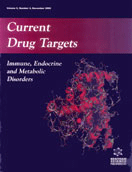Abstract
Over the past two decades significant progress has been made in elucidating the pathogenesis of thyroid cancer. The ongoing identification of mutations in cellular signaling pathways has revolutionized the field of thyroid cancer biology and has led to the development of novel new therapeutic agents. One of the signaling cascades implicated in the oncogenic process is the ERK pathway that normally functions to transmit mitogenic signals from the cell membrane to the nucleus. Genetic alterations of key components of this cascade, namely RET, Ras and Raf, are thought to result in constitutive activation of the pathway and subsequent thyroid tumorigenesis. Targeting of these components with pharmaceutical agents holds the potential of providing newer and more effective treatment modalities for thyroid cancer. Several such drugs are currently being developed to inhibit RET, Ras, Raf, as well as other factors impacted by the ERK pathway. These include a vast array of agents such as antisense compounds, small molecule inhibitors as well as inhibitors of farnesyl transferase, heat shock proteins, matrix metalloproteinases and histone deacetylases. Some of these drugs have already entered preclinical and clinical testing with promising anti-tumor effects. These as well as even newer agents may offer exciting possibilities for the future treatment of thyroid cancer.
Keywords: erk pathway, thyroid cancer, mitogenic signals, farnesyl transferase, heat shock proteins, matrix metalloproteinases
Current Drug Targets - Immune, Endocrine & Metabolic Disorders
Title: Targeting the ERK Pathway: Novel Therapeutics for Thyroid Cancer
Volume: 4 Issue: 3
Author(s): Sandra F. Williams and Robert C. Smallridge
Affiliation:
Keywords: erk pathway, thyroid cancer, mitogenic signals, farnesyl transferase, heat shock proteins, matrix metalloproteinases
Abstract: Over the past two decades significant progress has been made in elucidating the pathogenesis of thyroid cancer. The ongoing identification of mutations in cellular signaling pathways has revolutionized the field of thyroid cancer biology and has led to the development of novel new therapeutic agents. One of the signaling cascades implicated in the oncogenic process is the ERK pathway that normally functions to transmit mitogenic signals from the cell membrane to the nucleus. Genetic alterations of key components of this cascade, namely RET, Ras and Raf, are thought to result in constitutive activation of the pathway and subsequent thyroid tumorigenesis. Targeting of these components with pharmaceutical agents holds the potential of providing newer and more effective treatment modalities for thyroid cancer. Several such drugs are currently being developed to inhibit RET, Ras, Raf, as well as other factors impacted by the ERK pathway. These include a vast array of agents such as antisense compounds, small molecule inhibitors as well as inhibitors of farnesyl transferase, heat shock proteins, matrix metalloproteinases and histone deacetylases. Some of these drugs have already entered preclinical and clinical testing with promising anti-tumor effects. These as well as even newer agents may offer exciting possibilities for the future treatment of thyroid cancer.
Export Options
About this article
Cite this article as:
Williams F. Sandra and Smallridge C. Robert, Targeting the ERK Pathway: Novel Therapeutics for Thyroid Cancer, Current Drug Targets - Immune, Endocrine & Metabolic Disorders 2004; 4 (3) . https://dx.doi.org/10.2174/1568005310404030199
| DOI https://dx.doi.org/10.2174/1568005310404030199 |
Print ISSN 1568-0088 |
| Publisher Name Bentham Science Publisher |
Online ISSN 1875-5917 |
 1
1Related Articles
-
Meet Our Editorial Board Member
Anti-Cancer Agents in Medicinal Chemistry Hyperglycaemia and Vitamin D: A Systematic Overview
Current Diabetes Reviews Gamma-Secretase as a Pharmacological Target in Alzheimer Disease Research: When, Why and How?
Current Pharmaceutical Design Sirtuins as Possible Drug Targets in Type 2 Diabetes
Current Drug Targets 12-Lipoxygenase: A Potential Target for Novel Anti-Platelet Therapeutics
Cardiovascular & Hematological Agents in Medicinal Chemistry Structure-Based Approach for the Discovery of Novel Selective Estrogen Receptor Modulators
Current Medicinal Chemistry Molecular Targeting of Cell Death Signal Transduction Pathways in Cancer
Current Signal Transduction Therapy Targeting Angiogenesis in Ovarian Carcinoma
Current Cancer Therapy Reviews The CXCL12/CXCR4 Axis as a Therapeutic Target in Cancer and HIV-1 Infection
Current Medicinal Chemistry Kisspeptin Mediated Signaling in Cancer
Current Topics in Medicinal Chemistry Progesterone Receptor Membrane Component 1 and its Accomplice: Emerging Therapeutic Targets in Lung Cancer
Endocrine, Metabolic & Immune Disorders - Drug Targets Clinical Applications of Pinhole Single Photon Emission Tomography
Current Medical Imaging Inhibition of Aurora A Kinase by Alisertib Induces Autophagy and Cell Cycle Arrest and Increases Chemosensitivity in Human Hepatocellular Carcinoma HepG2 Cells
Current Cancer Drug Targets Histone Deacetylases: Anti-Angiogenic Targets in Cancer Therapy
Current Cancer Drug Targets Screening of Candidate Pathogenic Genes for Spontaneous Abortion Using Whole Exome Sequencing
Combinatorial Chemistry & High Throughput Screening Regulators of the G1 Phase of the Cell Cycle and Neurogenesis
Central Nervous System Agents in Medicinal Chemistry microRNAs in Cardiovascular Disease: Small Molecules but Big Roles
Current Topics in Medicinal Chemistry Vascular Effects of Estrogenic Menopausal Hormone Therapy
Reviews on Recent Clinical Trials Bench to Bedside Targeting of FLT3 in Acute Leukemia
Current Drug Targets Biologic Agents in the Treatment of Psoriasis
Recent Patents on Inflammation & Allergy Drug Discovery



















